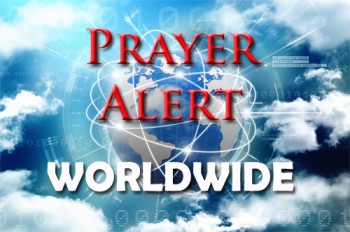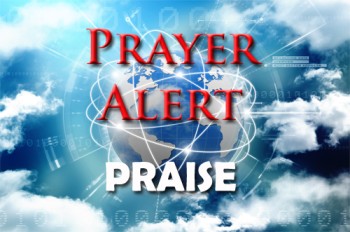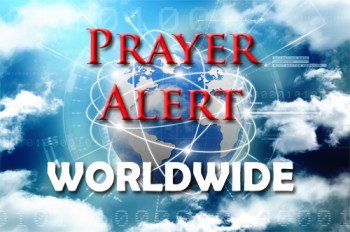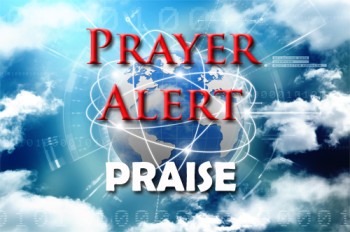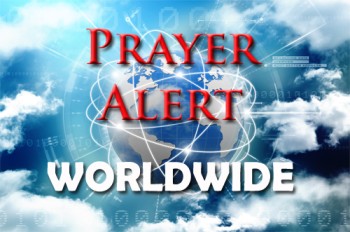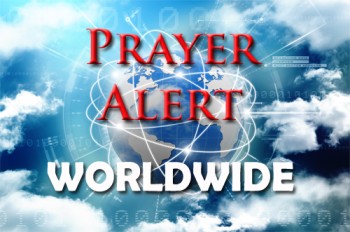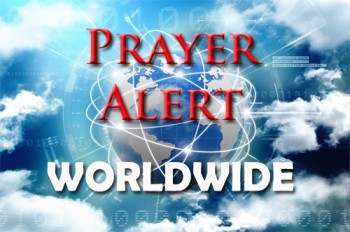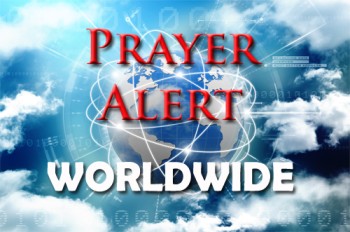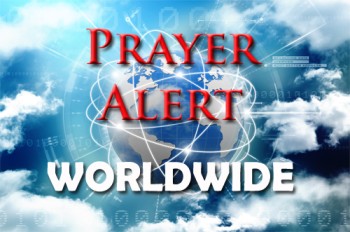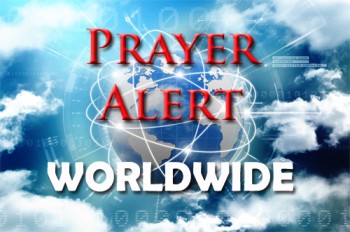Displaying items by tag: Africa
Libya: dangers of being a Christian
Libya is overwhelming Muslim: only 0.5% of the population is Christian. It is effectively a lawless land where to be a Christian is to live a secret life of faith. Those who leave Islam to follow Jesus face immense pressure to renounce their faith. Their community ostracises them, and they can be left homeless, jobless and alone. Telling others about Jesus can lead to arrest and even violent punishment. Believers are further exposed to danger since Libya has no central government, so laws are not enforced uniformly. Targeted kidnappings and executions are always a possibility for believers. Women generally live secluded lives under strict family control, making it extremely difficult for women who convert from Islam to Christianity. If discovered, they can face house arrest, sexual assault, forced marriage and even so-called ‘honour-killing’. A Libyan man becoming a Christian can lose his job (men are the family providers), be mentally abused and excommunicated from the family.
Kenya’s most wanted terrorist arrested
Rashid Mohamed Salim was cornered and captured by local youths on 29 January in a village in the DRC. He was handed over to the armed forces and arrested. University-educated Salim was radicalised as a teen at a popular mosque in Mombasa. He has been linked with recruiting youth into terror groups in East Africa, and with various terrorist activities. A source said, ‘This young man is a great terrorist. He is a very big player in the activities of slaughtering Christians. We have been receiving pictures and short films of him cutting Christians’ throats. He captures them or has them captured by fellow-rebels, then takes pictures of the murders on his phone and publishes them as propaganda.’ Kenya’s anti-terror police put a $100,000 reward for his capture. He was captured on his way back to Kenya from Cabo Delgado where he had joined Mozambique’s IS group.
Nigeria: militants kill Christians, soldiers do nothing
On 28 January a contact in Nigeria discovered over 500 bullet shells used in the killing of eighteen Christians in Ancha village, located about two hours from the capital of Plateau State. Villagers said the attackers were Fulani militants dressed in black while others wore the uniform of the Nigerian army. Thirty soldiers with AK47s were stationed in a classroom in the community when the attack happened. The converted classroom served as a barracks for the soldiers. Despite being stationed inside the village, the soldiers did not defend it against the invading militants. Instead, they stood by and watched as houses were burnt, cars and food were destroyed, and villagers were killed. During the attack, the soldiers protected only their two vehicles and the converted classroom. This attack is just the latest in a years-long pattern of militant violence committed against Ancha and neighbouring villages. Often bullet shells found belong to the army.
Chad: Bibles reaching the unreached
On 30 December, a Migaama New Testament was launched. A Christian said, ‘This translated word has above all given a freedom to put into practice the word of God at any time. It has broken certain traditions - grudges, difficulties with forgiveness, and reconciliation. It has given us strength to resist in difficulties. It has transformed this resentful people to become Christian people full of love. Finally, this word has become a shield for the Christian Migaami people. They continually make use of this shield to face up to difficulties.’ The leader of the Migaami said, ‘The word of God translated into our language can change lives.’
Global: persecution in 2022
Islamist extremists are gaining ground in sub-Saharan Africa, including Burkina Faso and Mali. Christians are bombed, killed, and kidnapped; schools are burnt. Jihadists have assaulted religious leaders and places of worship, and forced churches to close and meet in secret. The situation is set to grow worse as French troops withdraw from the area. Life for Christians in the Sahel region now resembles Nigeria, where Boko Haram terrorists, IS fighters and Fulani militants are active. For all three, Christian communities are their prime targets. Afghanistan and India are also countries of great concern. Since the Taliban recaptured Afghanistan, Christians have faced greater risks of violence and betrayal by family and neighbours. Major food shortages will increase pressure on them. Indian Hindu militants are attacking Christians, and some states have anti-conversion laws to prevent Christian outreach among the Dalits where many are turning to Christ.
CAR: UN probing alleged killings
The UN is investigating the death of people in the Central African Republic (CAR) by government forces and mercenaries with the Russian private military company Wagner. Over thirty civilians were killed, some by stray bullets, in the 16-17 January operation which targeted the Union for Peace rebel group. The UN mission known as MINUSCA received reports of the incident involving CAR troops and ‘other security personnel’. They sent a human rights team and security personnel there to assess the situation and take necessary measures to protect civilians. A military source, declining to be identified, suggested that the fighting is continuing, with forces and Russians committing massacres. ‘There have been summary executions and about fifty deaths.’ UN experts expressed concerns over ‘grave human rights abuses’ by the Wagner group, who take orders from the Russian defence ministry.
Nigeria: plans for Leah Sharibu's release?
The Nigerian government says efforts are under way to release Leah Sharibu, the Christian teenager who was one of 110 girls abducted in 2018 by the Boko Haram group ISWAP. Her classmates were released, but Leah refused to convert to Islam and was declared a ‘slave for life’ by ISWAP while remaining in captivity. The federal government announced it is using the military to ensure Leah and all captives regain their freedom, and armed groups operating in Nigeria’s northwest are now called terrorists. Reacting to the announcement, Dr Kathaza Gondwe, advocacy director for CSW, said, ‘It is belated news as Nigeria’s president has been promising Leah's parents since 2018 that he would work quickly to ensure her release. But it's a welcomed development. We can only pray the government will honour this commitment.’ CSW believes that categorising ISWAP as terrorists will help in how the armed forces deal with them.
Africa: Christian leadership training
There are not enough theology teachers or leaders for village congregations or the urban educated. There needs to be serious consideration of what kind of training is most appropriate for Africans, including teaching and communication methods, curriculum and content, and length of courses and modules. Too much foreign structure and content has been imposed. Africans must develop training that works for Africans and deals with the Afrocentric issues facing the Church. Out of 150 theological colleges and programmes, only two are at postgraduate level. Discernment is needed to know those anointed by the Spirit for future leadership and those applying for prestige, potential employment, desire for education, etc. Church poverty and lack of understanding among potential donors hamper developing Bible training institutions. Financial needs are endless. Generosity from African and global churches is required for such vital ministry to continue. Pray for abundant modular training and training-in-service for both lay leaders and pastors.
Somalia / Libya / Yemen: persecuted Christians
In Somalia, Islam is the state religion, and almost everyone is Muslim. The number of Christians is believed to be in the hundreds. Pray that each of our brothers and sisters will find continued strength and hope in Jesus ‘so that they will not grow weary or lose heart’ (Hebrews 12:3). In Libya Christians who want to stay safe must live a secret life of faith. This is made harder by there not being a centralised government. Laws are not widely enforced, making Christians further exposed to persecution. Pray for the provision of a government that strives to protect all its people. Secret Christians in Yemen live under constant threat because of their faith. Ask God to give them wisdom and boldness as they live out the gospel. Pray, too, for peace and stability in a country that has been engulfed in civil war for nearly a decade.
CAR: persecuted Christians
Despite being called a predominantly Christian country, the Central African Republic (CAR) is a difficult place for biblical disciples to live. Since 2012, Islamic rebel groups, called Seleka, have caused civil unrest. Fighters opposing the Seleka, the anti-Balaka, considered to be mostly ‘Christians’, have carried out brutal revenge killings. As with the Seleka, some anti-Balaka have targeted biblical followers of Christ. In truth, the anti-Balaka are simply non-Muslims. While 85% of CAR’s 5 million people identify as Christians, only 30% are thought to be committed followers of Christ. These believers are increasingly attacked, driven from their homes, and killed. Since the fighting began, over 1.2 million people have been relocated across CAR because of violence. Another 600,000 refugees live outside CAR, and 600,000 live in camps for internally displaced people. Pray for adequate donations to be given to aid agencies providing thousands with food, shelter, and medicine.
